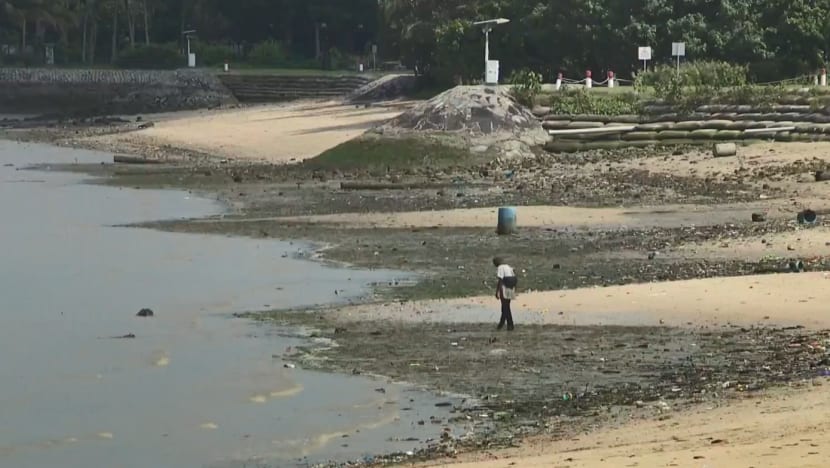Pasir Ris beach recreational centres take extra precautions over higher bacteria levels in seawater
Although NEA has given the go-ahead for activities such as sailing, kayaking and canoeing, some watersports centres are already taking a hit in bookings.

A man walks along Pasir Ris beach. The NEA has warned the public not to swim at the beach until further notice due to more frequent readings of elevated bacteria levels in the water.

This audio is generated by an AI tool.
SINGAPORE: Some recreational centres at Pasir Ris beach are seeing fewer customers even as they take extra precautions over elevated levels of bacteria detected in the waters.
Several centres have stopped the rental of certain equipment, while others have reduced water time for activities and advised those kayaking or canoeing to head to safer areas out at sea.
This comes after the levels of Enterococcus bacteria detected at the beaches in Pasir Ris Park, as well as Sembawang Park, have been higher than average, which increases the risk of gastrointestinal infection if the water is ingested.
The NEA last Monday (Feb 5) advised against engaging in activities that involve frequently dipping the body or head in the water, including swimming, wakeboarding, windsurfing and water immersion training.
Although the agency has given the go-ahead for other activities such as sailing, kayaking and canoeing, some recreational centres have taken a hit in bookings.
FEWER RENTALS, MORE PRECAUTIONS
The KOKOMO Beach Club at Pasir Ris, which organises weekly coastal cleanup expeditions, has seen a few cancellations following the advisory.
The centre, which is managed and operated by Outdoor Adventures, is also seeing a drop in equipment rental from worried patrons.
“Our usual kayak enthusiasts frequent us for their practice, such as capsize drills. But (because) they have to put their heads (underwater) for such activities, they are like ‘I shall not do that for this time period’,” said Mr Berwin Tan, the firm’s chief operating officer.
Many who rent kayaks to fish in the open sea have also shifted their fishing location.
“A lot of them are quite wary about (the bacteria) as well … because they will be catching fish for personal consumption. Many have decided ‘let’s go to the Changi side, where it is probably safer’,” said Mr Tan.
For customers who do show up, the club has added on NEA’s advisory in its safety briefing to inform kayakers of the risks involved and advise them to take precautions.
“You are, to some extent, still going to be in contact with the water even if you're kayaking. We tell customers to avoid getting out of the kayak, and to go a bit further out (to sea) as well,” he said.
“The water condition is measured more towards the shoreline. We know where the perimeters are – go further out (away from the shoreline) and it’s fine.”
People’s Association’s PAssion Wave, which offers a range of waterfront activities, has temporarily ceased stand-up paddleboard (SUP) rental at its Pasir Ris and Sembawang outlets.
In response to queries from CNA, the club said it has implemented precautionary measures at the two branches to minimise potential risks following NEA’s advisory.
These include reducing water time for activities – kayak rentals are now limited to two hours – and mandatory rinsing and disinfection of equipment for organised groups.
The club is also encouraging the public to engage in watersports and lifestyle activities at its other branches at Jurong Lake Gardens, Bedok Reservoir, East Coast and Marina Bay instead.
A LEARNING OPPORTUNITY
The Ocean Purpose Project, a social enterprise whose activities include beach cleanups and monitoring seaweed growth, has also been affected as many of its events involve the use of kayaks and SUPs.
“We have brought back some COVID-19 protocols and precautions, including hand-washing before and after an event, and the use of water-based hand sanitisers that are safe for aquaculture,” its founder Mathilda D'silva said.
“When we're doing a beach cleanup, we don't wade into the water. We encourage people not to swim into the sea to collect rubbish.”
Despite the inconvenience, the enterprise said the situation presents a teaching opportunity to help the public recognise the importance of ocean health.
“Unfortunate incidents like this elevated bacteria levels actually helps us to now explain to Singaporeans the link between humans and oceans. Seas are not just polluted with plastics, we are also facing sewage pollution, agricultural runoff, bacterial blooms,” she said.
She also emphasised the need for clean waters to ensure the sustainability of fish farms around Singapore and safeguard food security.
“Everybody needs clean seas to operate,” said Ms D'silva, adding that she hopes the situation does not deter the public from joining her group’s environmental activities at a time when nature needs help more than ever.
Early findings show that the higher bacteria levels at the two beaches are from inland sources, and not from outside of Singapore.
Responding to CNA queries, the NEA said it is working with other agencies to mitigate possible sources.
Beachgoers are encouraged to refer to the Beach Short-term Water Quality Information (BSWI) on the NEA website or the myENV app if they intend to engage in water activities, said the agency.
Additional reporting by Natasha Ganesan.

















